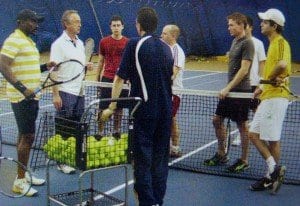Lessons from a First-Time USTA Team Captain
“My advice to you is DON’T CAPTAIN! It’s a thankless job full of time-sucking organizing tasks and it won’t help you with your goal to be a better player.”
Fortunately, my terror subsided a few minutes later when some other guys chimed in and basically said, “Disregard what he said! It can be a great experience if you have a good group of guys and the right mindset.”
I had entered the season with what I feared might be an overly idealistic mindset that risked getting crushed: My goal was to build a team focused on player development, not winning per se— a vision that my terrific co-captain, Zach Goldman, shared. I imagined a group of guys coming together regularly to train with each other under the supervision of coaches who would push us to improve both technically and strategically. Having been deeply influenced by sports psychologist Jeff Greenwald, I wanted to create a culture where team members entered matches with a goal of playing their best, not “winning”– free to test drive what they’d been working on in practice, and liberated from the stress of “letting the team down” if they lost. Most importantly, I wanted everyone to have a fun and rewarding experience.
We drafted and circulated a MISSION STATEMENT to the players we were recruiting, which proved incredibly valuable in setting the tone from the start:
Our team’s mission is help passionate tennis players in NY to achieve peak performance in competition and to take their game to the next level. Winning is great—but our primary objective is to foster effective player development and a rewarding team experience.
We also outlined a set of TEAM VALUES AND EXPECTATIONS that helped get everyone on the same page and went a long way in fostering the culture we wanted to build:
- Participation – We encourage you to attend as many practice and coaching sessions as you can, and we will continue to work to make the sessions as productive as possible.
- Reliability – In fairness to everyone on the team, we expect players to (1) show up for practices they’ve committed to attend; (2) pay for practice/match fees in a timely manner; (3) never miss a scheduled match. If unexpected conflicts arise, we expect you to give ample notice so we can make other arrangements.
- Being early for matches – “To be early is to be on time, to be on time is to be late.” Plan to arrive at your scheduled matches 30 minutes prior to check in with the acting captain and begin warming up. With 7 other players depending on you at every match, this is crucially important.
- Exemplary behavior at matches – We expect our team always to uphold the highest ethical standards at matches and to win and lose gracefully under all circumstances (Read “The Code”).
- Communication and flexibility– We want to create the best experience possible for everyone, so let us know early if you have specific preferences or priorities. We always welcome timely and constructive feedback. We will make every effort to accommodate requests and integrate feedback; in return we ask for your understanding and help if we can’t meet all your requests.
- Positive attitude, mutual support, and a sense of humor – On the court, we expect every team member to contribute to a positive atmosphere for teammates. Each of you will have good and bad days, great wins and hard losses: help keep others up when they’re down and they’ll do the same for you. What’s most important to us is how you play, not whether you win.
 In addition, I think it made a big difference that Zach and I did everything we could to keep things incredibly organized and avoid situations where endless strings of all-group emails were cluttering team members’ in-boxes. We surveyed everyone’s availability for matches at the start of the season using Meeting Wizard so we only had to ask once and could view a “dashboard” of availability at any time. We also set up a password-protected team website (using the free PBWorks wiki site) that included the match schedule, contact information, upcoming practice dates, and the lineup as soon as we had it for upcoming matches. Not every team member used the site a lot, but those who did loved it– and for Zach and me it was a godsend to keep track of tons of information. To track RSVPs for practices, we used Evite– which also cut down on unnecessary emails flying around. Importantly, I think all of this organizational effort sent a signal to every team member that we truly valued and respected their time and contributions– which may help explain why our teammates were so consistently responsive and gave so much back over the course of the season.
In addition, I think it made a big difference that Zach and I did everything we could to keep things incredibly organized and avoid situations where endless strings of all-group emails were cluttering team members’ in-boxes. We surveyed everyone’s availability for matches at the start of the season using Meeting Wizard so we only had to ask once and could view a “dashboard” of availability at any time. We also set up a password-protected team website (using the free PBWorks wiki site) that included the match schedule, contact information, upcoming practice dates, and the lineup as soon as we had it for upcoming matches. Not every team member used the site a lot, but those who did loved it– and for Zach and me it was a godsend to keep track of tons of information. To track RSVPs for practices, we used Evite– which also cut down on unnecessary emails flying around. Importantly, I think all of this organizational effort sent a signal to every team member that we truly valued and respected their time and contributions– which may help explain why our teammates were so consistently responsive and gave so much back over the course of the season.
We also tried something pretty unorthodox for practices: we used a “pay what you can” approach, giving players a suggested range for contributions to offset court and pro fees. We didn’t want anyone to have to miss a practice for financial reasons, which given the cost of living in NYC is no small matter. My co-captain and I knew we were risking taking a bit hit financially for that, but it turned out that most players contributed enough to offset most of the costs. We’re really glad we took the risk.
Finally, we were helped in a big way at the start of the season by reading the advice from fellow captains on “Player to Player: Captaining a League Team” as well as the great summary prepared by our regional USTA coordinator, Deb-Rose Andrews, of the top lessons learned/advice she received from veteran captains in our region. Below is an edited version – and I’ve bolded the things I personally think are most important.
COMPILATION OF ADVICE FROM METRO REGION USTA CAPTAINS
Team Set-Up:
Assign specific responsibilities to your co-captain. Communicate regularly and divide the work and handling of matches. If you don’t have a co-captain, consider recruiting someone to help with the team to:
- Arrange practices
- Track payments to make sure everyone has paid for practices and matches
- Check registrations and follow up with players who haven’t registered yet.
- Send out the match reminders
Recruiting/Players:
- Finding players/good people is hard. Have your team help by recommending people they know, or run into at tournaments, local parks, etc. You can also put notices up at the local courts, your building, work, etc. There are many tennis players who would like to get involved, you just have to find them.
- Make sure you have a core group of people who love to play. They are the ones who will save you when you have a cancellation. Fill out the team with other players and make sure they get a minimum of two matches.
- Have enough players on your team – at least 16. Some players won’t be able to make many matches, and some players may get injured during the season.
- If you have new players who you have not seen play – invite them to a practice before you have them register. This gives you the opportunity to see how the person plays and if their philosophy/personality fits with the team. This is especially important with doubles players.
- It’s a good idea to check in with your players during the season. A quick, one-on-one conversation to see how they are doing, if they are enjoying their matches, etc. is ideal. It will give you some insight and makes them feel invested in the team.
Team philosophy
- Determine this ahead of time with your co-captain. Do you want a team where the captain makes all the decisions (this is the majority of our teams) or one that is run by consensus. Make sure your players know the team philosophy.
- Are you playing to have fun or to be competitive and win? If everyone wants to have fun, divide the matches up evenly. If your team wants to win and will play the best pairing for every match – this should be clear. Being upfront about this will avoid problems at the end of the season. The team will understand why the players with winning records would be scheduled for important matches or the playoff’s. Line-up’s can become very emotional, so it’s good to have the goal clearly stated at the beginning.
- Try to always be positive and encouraging. Players can get frustrated – but in every match someone must lose. Don’t make the team/player feel bad after a loss – find something positive. It can be as simple as “Everyone fought hard today.”
Match Schedule/Line-Up’s
- Create a spreadsheet with all of your players and all of the matches (including date, time & location). Use this spreadsheet to keep track of who is available.
- When you have the schedule from the league, ask your players if they are available, not available or maybe. Insert this information into the spreadsheet. It will help you plan line-up’s. You’ll then quickly know which matches may be problematic with availability.
- Know who on your team has a car, and where they live. This can be helpful with transportation issues and trips to clubs – especially Randall’s Island.
- Play your courts according to strength. Each court is worth points, so you want to put your players in the best position to win.
- Send the line-up out at least 1.5 – 2 weeks before the match. Have the players confirm back to you. It is also helpful to have 1-2 people as designated substitutes. They are on-call in case someone has an issue or becomes ill on the match day.
- Inform the entire team who is playing in each match, and who the sub is. It is better for people to know if they are playing or not – rather than just wondering if the line-up went out. They might schedule something else.
- Make a contact list with everyone’s email and cell phone number. This should be distributed to the entire team and put into your tennis bag. It is also helpful to list the opposing captain’s contact information and the coordinator’s cell phone number on this sheet.
- Put your player cell phone numbers into your phone – so you can easily call a missing player. Make sure your team has your cell phone number.
- Send a match reminder the morning before the match and include the match day, time & location. It’s helpful to include the match day time & location in the subject line, and then again in bold in the body of the text. Remind your players if they are supplying the balls or not (the home team supplies the balls). Have the players confirm back one final time. Make sure you include the captain (or acting captain’s) cell phone number in case anyone has issues or is delayed getting to the match.
MATCHES
- Try to attend as many matches as possible. If you have a co-captain – split that responsibility. Whoever is running the team that night must have the rule document and the team contact list with them.
- Make sure your players know who they should call if they are running late, lost, etc. This will avoid the panic of a missing player and you don’t know where they are.
SOCIAL
- Scheduling practices and social events helps build team spirit and chemistry – especially on new teams where players don’t know each other.
- If you and the co-captain don’t have time, ask a player to help arrange practices.
- Have patience. People often don’t respond to emails and you have to reach out to them a few times.
Feel Free to reach out to me directly at roadto45@gmail.com and be sure to follow me on social media!




[…] My inspiration to write this blog post is thanks to PJ at http://www.roadto45tennis.com/ http://www.roadto45tennis.com/lessons-from-a-first-time-usta-captain/ […]
So true, everything in this post. I did my maiden season as USTA team captain in Men’s 4.0 in Fall 2014 and led my team to the city playoffs, though we couldn’t make the championship game. I used the messaging app called whatsapp to coordinate practice and send updates to team, had setup a ‘group’ for the team in same. We also had a google group for email communication and used it for sharing match lineup and match results (though the whatsapp group was used interchangeably sometimes). Also used Google drive to share videos or any documents. Used a excel… Read more »
Great stuff, thanks for sharing! PJ
Was inspired to put down my experience in the blog post below,
https://tenezious.wordpress.com/2016/01/19/learning-the-ropes-of-captaining-a-usta-league-team/
-VJ
Excellent piece VJ!
Thanks for the nice blog, very useful. Keep sharing such ideas in the future as well. I am glad to come here!
I had played USTA leagues before, and enjoyed a lot: team mates and captains were really committed, everything worked good. but hey, this season with Goldman-Simmons team was wonderful. Besides, playing in sunny California is easier than doing it in NYC… so I have to give all the credit in the world to PJ and Zach for their amazing job. They made us feel like a family, and didn’t let any loose end on the organization of practices and matches. Yes, we didn’t make it to the Divisionals… but I’m pretty sure next year we’ll be there!!!!
I had the pleasure of co-captaining the above mentioned team with PJ. I want to echo all of PJ’s comments above, but in particular encourage those of you who are considering becoming a team captain to take the plunge! It is incredibly rewarding, and is a great way to meet some great people and develop new relationships.
I have worked with this team 2x and was amazed by the respect and trust this team had in their leader. They were focused, hungry to learn and very supportive of each other. It was so enjoyable and refreshing to be around. And now, after reading this entry, I know why. I will definitely share this entry to all of my tennis friends and colleagues that lead and/or are part of a league/team.